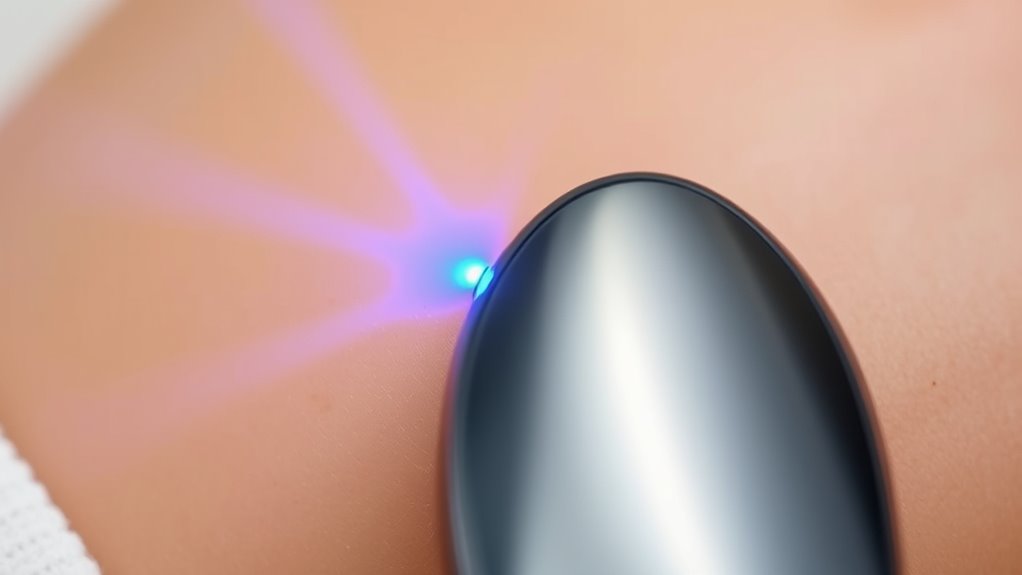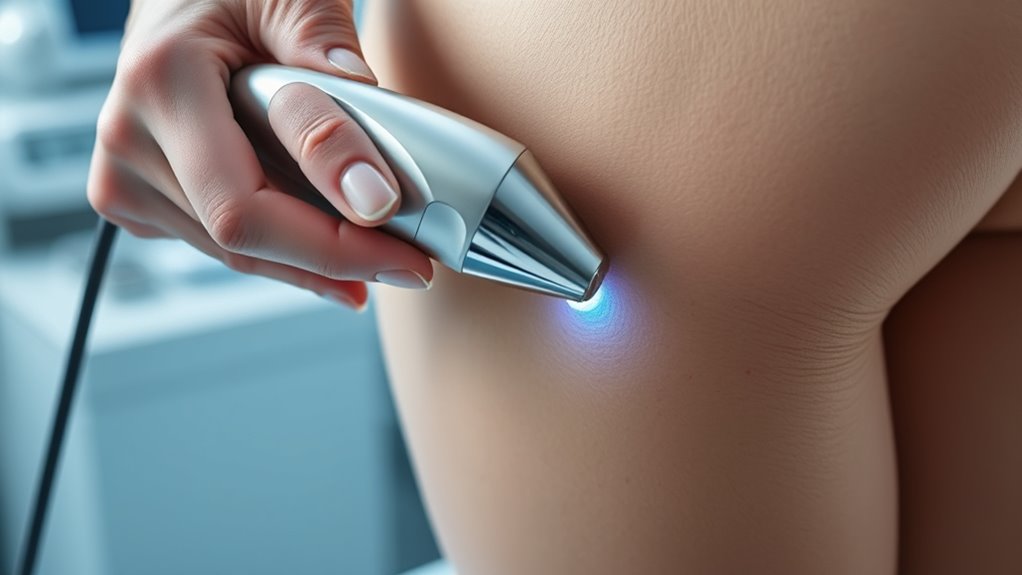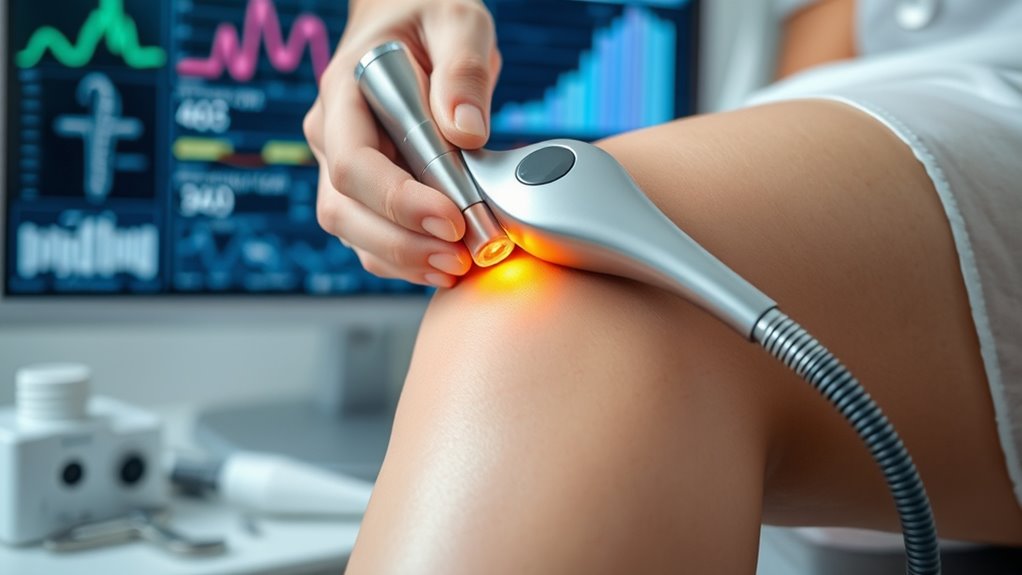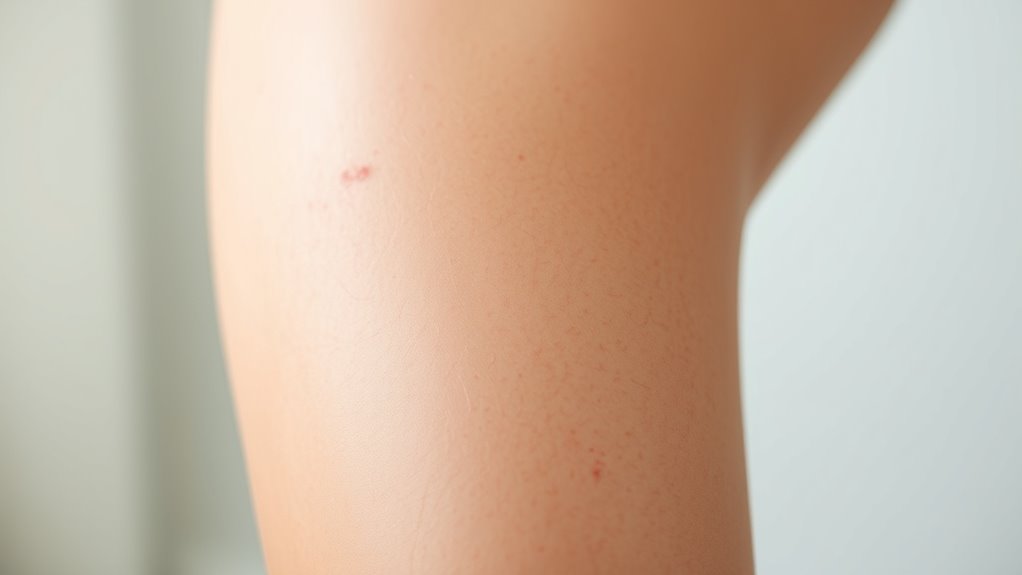Laser hair removal targets hair follicles locally without affecting your hormones or the glands that regulate them. It heats and destroys hair roots in treated areas, providing a more permanent reduction in hair growth. This process doesn’t disturb your hormonal balance or cause long-term changes in your body’s hair patterns. If you want to understand how hormonal fluctuations might influence your results over time, your upcoming information will help clarify.
Key Takeaways
- Laser hair removal targets hair follicles locally without impacting hormone production or endocrine system function.
- It permanently damages hair roots but does not alter the hormonal signals that regulate hair growth.
- Hormonal fluctuations can influence hair growth post-treatment, but the procedure itself does not cause hormonal imbalance.
- Conditions affecting hormones, like PCOS or thyroid issues, may affect treatment outcomes but are unrelated to laser effects.
- Managing hormonal health can help optimize and maintain long-term hair reduction results.
Understanding How Laser Hair Removal Works

Laser hair removal works by targeting hair follicles with concentrated light energy. When the laser heats the follicle, it damages the hair’s ability to grow, leading to smoother skin over time. Unlike cosmetic tattooing, which deposits pigment into the skin, laser treatment focuses on destroying hair roots without affecting surrounding tissue. You might consider hair removal creams as an alternative, but they often provide only temporary results and can irritate your skin. Laser therapy offers a more permanent solution, especially for those with darker, coarser hair. The process requires multiple sessions to target hair in different growth stages. Understanding how it works helps you set realistic expectations and choose the right options for your hair removal needs. Additionally, understanding the tax implications of laser hair removal can help you make informed decisions if considering it as a cosmetic expense.
The Role of Hormones in Hair Growth

Hormones play a crucial role in regulating hair growth by signaling hair follicles to cycle through phases of growth, rest, and shedding. This process, known as hormonal regulation, is driven by the endocrine system’s influence on your body’s internal balance. Androgens, like testosterone, stimulate hair growth in certain areas, while estrogen can slow it down. Your hormones determine where, when, and how thick your hair becomes. Fluctuations in hormone levels—due to age, health, or lifestyle—can lead to changes in hair patterns. Understanding this endocrine influence helps explain why some people experience increased hair growth or loss during specific life stages. Additionally, hormonal imbalance can significantly impact hair growth patterns and overall hair health. Ultimately, hormones are key messengers that directly affect the behavior of hair follicles and overall hair growth.
Common Areas Treated With Laser Hair Removal

You’ll find that certain areas are more popular for laser hair removal, like the face, underarms, and bikini line. Many clients choose these zones to reduce hair growth and boost confidence. Let’s explore why these spots are common targets and what results you can expect. Additionally, some individuals notice changes in hormonal hair growth patterns following treatment, which can vary based on individual hormonal balance.
Popular Treatment Zones
Popular treatment zones for laser hair removal vary depending on individual preferences and cultural trends. You might opt to target areas like your legs, underarms, or bikini line to achieve smooth skin and effective hair reduction. These zones are popular because they offer visible results and require minimal maintenance once treated. Laser skin treatments in these areas are designed to target hair follicles precisely, reducing hair growth over time. Many people choose these zones for their convenience and aesthetic appeal. Whether you’re aiming for a more streamlined look or simply want to avoid shaving and waxing, these areas are common choices. Proper treatment in these zones can lead to long-lasting hair reduction, boosting your confidence and simplifying your grooming routine. Additionally, understanding the underlying hormonal factors influencing hair growth can help set realistic expectations for laser hair removal outcomes.
Facial Hair Areas
Have you ever considered how laser hair removal can effectively address unwanted facial hair? Many people seek treatment for facial hair because hormonal shifts, like those during puberty or menopause, can cause increased growth in areas like the upper lip, chin, or cheeks. Laser treatments target these areas precisely, reducing hair growth over time. While hormonal fluctuations can sometimes lead to new or persistent facial hair, laser hair removal often provides a long-term solution. It’s important to understand that hormonal changes may influence the results, but most clients see significant reduction regardless. Regular sessions can help manage facial hair, boost confidence, and improve skin appearance. Just remember, automation technologies are increasingly integrated into various fields, highlighting the importance of consistent treatment and maintenance to achieve optimal outcomes.
Underarm and Bikini
Underarm and bikini areas are among the most common targets for laser hair removal, offering a convenient solution for persistent hair growth in these sensitive regions. Many people choose these areas because laser treatments are generally painless procedures, especially when performed by experienced professionals. The procedure is suitable for various skin types, but results may vary depending on your skin tone and hair color. Modern laser devices can effectively target hair follicles with minimal discomfort, making it an appealing option for those seeking quick, discreet results. Regular treatments can lead to long-lasting smoothness, reducing the need for shaving or waxing. Additionally, understanding personal finance management can help you budget for ongoing treatments and related expenses, ensuring you can maintain your desired results without financial strain. Overall, laser hair removal in these areas provides a safe, efficient, and comfortable way to manage unwanted hair.
Does Targeting Hair Follicles Impact Hormonal Balance?

While targeting hair follicles through laser hair removal is generally considered safe, many wonder if this process could influence hormonal balance. The procedure focuses on destroying hair follicles without affecting the glands that regulate hormones, so it’s unlikely to disturb hormonal stability. However, some people worry about changes in follicle sensitivity—whether repeated treatments might alter how hair responds to hormonal signals over time. Current evidence suggests that laser hair removal doesn’t interfere with the body’s hormonal functions, as it targets specific follicles rather than any endocrine organs. If anything, it primarily affects the hair growth cycle locally, leaving your hormonal balance intact. So, you can generally expect laser treatments to have minimal impact on your overall hormonal health.
Scientific Studies on Laser Hair Removal and Hormonal Changes

Numerous scientific studies have examined whether laser hair removal affects hormonal levels, and the evidence so far indicates minimal to no impact. These studies focus on hormonal regulation and whether cosmetic procedures like laser treatments disrupt endocrine function. Most research shows that laser hair removal targets hair follicles without interfering with hormone production or balance. The procedure works by damaging hair roots, not altering the glands responsible for hormone regulation. As a result, your hormonal levels remain stable, and hormonal hair growth isn’t affected. Scientific data consistently support the safety of laser hair removal regarding hormonal health. This reassures you that undergoing cosmetic procedures like laser treatments shouldn’t influence your body’s hormonal balance or lead to unexpected changes in hair growth patterns driven by hormonal fluctuations. Additionally, understanding the hormonal regulation mechanisms can help clarify why these procedures have minimal impact on hormonal balance.
Factors Influencing Hormonal Hair Growth Post-Treatment

Although laser hair removal doesn’t directly alter hormonal levels, several factors can influence hormonal hair growth after the procedure. One key factor is hormonal therapy, which can shift hormone balances and stimulate hair growth in targeted areas, regardless of laser treatment. Your genetic predisposition also plays a significant role; if you’re genetically prone to hormonal hair growth, you might notice new or increased hair even after treatment. These factors can cause hair regrowth or persistence despite the effectiveness of laser removal. It’s essential to take into account your hormonal health and family history when evaluating potential outcomes. While laser hair removal targets existing hair, underlying hormonal influences can still promote new growth, making it important to address these factors alongside your treatment plan. Additionally, understanding digital literacy programs can help you stay informed about advancements in hair removal technologies and related health considerations.
Conditions That Affect Hormonal Hair Growth and Laser Treatments

Your hormonal balance plays a significant role in how hair grows and responds to laser treatments. Conditions like PCOS or thyroid issues can interfere with your results. Understanding these underlying medical factors helps you manage expectations and choose the right approach. Additionally, hormonal fluctuations can sometimes be influenced by AI in healthcare, which offers advanced diagnostic tools to better understand and manage hormonal health.
Hormonal Imbalances Impacted
Hormonal imbalances can considerably influence hair growth patterns and impact the effectiveness of laser hair removal treatments. When your hormones are out of balance, they disrupt the normal hair growth cycles, causing excessive or uneven hair growth. This means that even after laser treatments, new hair may still appear or grow thicker in certain areas. Factors like stress, thyroid issues, or hormonal conditions can intensify these effects. Understanding how hormonal imbalances affect hair growth cycles helps you set realistic expectations for laser hair removal results. Additionally, hormonal fluctuations can alter the texture and density of hair, making it more resistant to treatment.
Consider these points:
- Hormonal fluctuations can prolong the anagen (growth) phase
- Imbalances may cause hair to regrow faster
- Certain conditions can lead to thicker or coarser hair
- Hormonal shifts can reduce treatment effectiveness
- Consistent hormonal health supports better laser outcomes
Underlying Medical Conditions
Certain medical conditions can considerably influence hormonal balance and, consequently, affect hair growth and the success of laser treatments. Conditions like polycystic ovary syndrome (PCOS), thyroid disorders, and adrenal issues disrupt hormone levels, leading to abnormal hair growth patterns. If you’re undergoing hormonal therapy for any of these conditions, it’s essential to inform your practitioner before laser hair removal. Medical conditions that alter hormone production may reduce the effectiveness of treatments or cause unexpected hair regrowth. Addressing these underlying issues with your healthcare provider can improve your results. In some cases, managing the medical condition or adjusting hormonal therapy can restore hormonal balance, making laser treatments more successful and reducing the risk of unwanted hair regrowth.
Potential Side Effects of Laser Hair Removal Related to Hormones

While laser hair removal is generally considered safe, hormonal fluctuations can sometimes lead to unexpected side effects. You might experience changes in skin sensitivity or cosmetic pigmentation, which can be influenced by hormonal shifts. These effects are usually temporary but can be bothersome. You should watch out for:
- Increased skin sensitivity or irritation
- Changes in pigmentation, such as darkening or lightening
- Unexpected hair growth in untreated areas
- Persistent redness or inflammation
- Minor hormonal acne around treated zones
Hormonal changes can make your skin react differently, especially if you have sensitive skin. It is crucial to communicate with your provider about any hormonal concerns before treatment. While these side effects are rare, understanding them helps you manage expectations and ensure safe, effective results.
Long-Term Effects of Laser Hair Removal on Body Hair Patterns

Long-term laser hair removal can lead to changes in hair density and growth patterns over time. Hormonal fluctuations may influence how your body responds years after treatment. Understanding these effects helps you anticipate potential shifts in your hair growth, ensuring better long-term results.
Changes in Hair Density
Laser hair removal can lead to notable changes in hair density over time, especially in treated areas. As the follicle response diminishes, you’ll likely notice a reduction in hair density, with fewer active hairs growing back. Some individuals may experience areas with sparse, patchy hair, while others see a significant decrease overall. These changes are often permanent, but the degree varies depending on skin type and hair color. You might also experience altered hair growth patterns, such as finer or lighter hairs. Keep in mind, the long-term effects depend on how your follicles respond during treatment. To understand your specific outcome, monitor areas post-treatment and consult with your provider if you notice unexpected changes.
- Reduced hair density in targeted zones
- Fewer active follicles over time
- Thinner, finer hair regrowth
- Patchy or uneven hair patterns
- Permanent or long-lasting results
Hormonal Fluctuation Impact
Hormonal fluctuations can considerably influence the long-term effects of laser hair removal on your body’s hair patterns. Changes in your hormonal levels, driven by emotional stability or dietary influences, may cause new hair growth despite previous treatments. Even if you’ve achieved smooth skin, hormonal shifts can stimulate dormant hair follicles, leading to localized or increased hair growth over time. Maintaining emotional stability helps regulate hormonal balance, reducing unpredictable hair growth. Likewise, dietary influences—such as nutrient intake or hormonal-boosting foods—can impact your hormonal health and hair patterns. While laser hair removal targets existing hair, these fluctuations can alter future growth, making it essential to monitor your emotional and dietary health. Staying consistent with overall wellness can help support long-term hair management.
Long-Term Hair Patterns
Over time, the effects of laser hair removal can lead to noticeable changes in your body’s hair patterns, but these changes aren’t always permanent. You might see reduced hair density or altered distribution, but some areas may experience regrowth or changes in hair texture. Pediatric concerns often focus on long-term effects, especially in young skin, to guarantee safety. Additionally, hormonal fluctuations can influence hair patterns even after treatment. Keep in mind:
- Hair may become finer or coarser
- Some areas might develop new hair growth
- Regrowth can occur in untreated or resistant follicles
- Hair texture may change, affecting appearance
- Long-term, some individuals notice patchy or uneven hair patterns
These factors highlight the importance of ongoing monitoring and realistic expectations regarding permanent results.
Expert Opinions on Hormonal Responses to Laser Hair Removal

Since hormonal fluctuations can substantially influence hair growth, experts emphasize the importance of understanding how laser hair removal interacts with these changes. They recognize that hormonal regulation plays a key role in hair follicle response, which varies among individuals. Many specialists believe that laser treatments primarily target actively growing hair follicles, which are affected by hormonal levels. However, some experts caution that hormonal shifts—such as those during pregnancy or menopause—may cause new hair growth even after treatment. While laser hair removal effectively reduces hair in most cases, these professionals agree that hormonal factors can influence long-term results. Overall, experts suggest that managing hormonal imbalances alongside laser treatments can optimize outcomes and minimize unexpected hair growth.
Frequently Asked Questions
Can Laser Hair Removal Cause Hormonal Imbalances Long-Term?
You might wonder if laser hair removal impacts hormonal stability long-term. Generally, it doesn’t cause hormonal imbalances because the procedure targets hair follicles without affecting your endocrine system. While some hair regrowth can occur due to hormonal fluctuations, laser treatment itself isn’t linked to altering hormones. So, if you’re concerned about hormonal health, rest assured that laser hair removal is unlikely to disrupt your hormonal balance or cause long-term issues.
Does Laser Treatment Affect Internal Endocrine Organs?
Did you know that laser hair removal is considered safe for most people? When it comes to your endocrine health and hormone regulation, the procedure targets hair follicles without affecting internal organs. You won’t experience disruptions in hormones or endocrine function because laser energy doesn’t penetrate deeply enough to impact your endocrine organs. So, rest assured, laser hair removal primarily affects hair follicles and leaves your internal hormone balance untouched.
Are Hormonal Fluctuations Necessary for Effective Laser Hair Removal?
Hormonal fluctuations aren’t necessary for effective laser hair removal. Instead, maintaining hormonal stability helps guarantee your hair remains in the active growth phase, which is vital for successful treatment. Laser targets hair during this phase, so scheduling sessions when your hair is in the anagen stage improves results. Consistent treatments aligned with your hair cycle maximize effectiveness, but hormonal changes don’t directly impact the process markedly.
How Does Age Influence Hormonal Responses to Laser Treatments?
Imagine a gentle tide ebbing and flowing—your body’s natural rhythms. As you age, this tide shifts, bringing subtle changes in hormonal sensitivity. These age-related changes influence how your body responds to laser treatments, potentially making hair removal more or less effective over time. Understanding this dance helps you anticipate results, knowing that your body’s evolving hormonal landscape plays a quiet but essential role in your hair removal journey.
Can Laser Hair Removal Improve Conditions Caused by Hormonal Disorders?
Laser hair removal can help improve conditions caused by hormonal disorders, especially in areas with abnormal hair growth. It targets hair follicles, reducing excess hair regardless of skin pigmentation or hair color. However, results may vary depending on your skin type, and you should consult a specialist to confirm safe treatment. While effective for many, it doesn’t treat hormonal imbalances directly but can improve the appearance of affected areas.
Conclusion
While laser hair removal targets hair follicles to reduce unwanted hair, it doesn’t directly influence your hormones. Think of it like trimming a hedge—your body’s hormonal signals still determine how hair grows back elsewhere. So, even if you see less hair in treated areas, your hormones continue their natural rhythm. Ultimately, laser treatments and hormonal health are separate, yet both shape your body’s unique hair story—one shaping the surface, the other the unseen roots.









